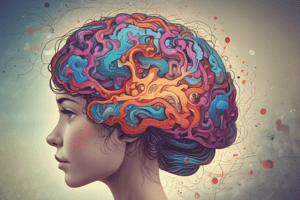Podcast
Questions and Answers
Which statement best describes the contrasting viewpoints of John Locke and Jean-Jacques Rousseau regarding child development?
Which statement best describes the contrasting viewpoints of John Locke and Jean-Jacques Rousseau regarding child development?
- Locke emphasized innate processes, while Rousseau focused on environmental influences.
- Locke studied evolutionary recapitulation, while Rousseau focused on the role of education in creating a perfect citizen.
- Locke advocated for stage-based development, whereas Rousseau saw development as continuous.
- Locke viewed the mind as a 'blank slate' shaped by experience, while Rousseau believed in innate developmental stages. (correct)
How did Charles Darwin's theory of evolution influence early developmental psychology?
How did Charles Darwin's theory of evolution influence early developmental psychology?
- It prompted the study of how childhood experiences shape adult personality through evolutionary recapitulation.
- It led to the concept that human development might echo evolutionary history, with behaviors rooted in past adaptations. (correct)
- It led to an emphasis on strict environmentalism, suggesting behavior is solely learned.
- It inspired the idea that development occurs in distinct stages mirroring societal norms.
What was G. Stanley Hall's primary contribution to the field of developmental psychology?
What was G. Stanley Hall's primary contribution to the field of developmental psychology?
- He was the first to propose stage-based theories of development.
- He established scientific journals and courses dedicated to child development research. (correct)
- He conducted quantitative research on sensorimotor development in infants.
- He developed the concept of 'tabula rasa' to explain how learning shapes children.
How did G. Stanley Hall apply Darwin's theory to human development?
How did G. Stanley Hall apply Darwin's theory to human development?
What distinguishes James Mark Baldwin's approach to studying development from that of earlier theorists like Rousseau?
What distinguishes James Mark Baldwin's approach to studying development from that of earlier theorists like Rousseau?
If a modern developmental psychologist were to align most closely with John Locke's philosophy, what would they likely investigate?
If a modern developmental psychologist were to align most closely with John Locke's philosophy, what would they likely investigate?
How might a researcher apply the concept of 'ontogeny recapitulates phylogeny' in a contemporary study?
How might a researcher apply the concept of 'ontogeny recapitulates phylogeny' in a contemporary study?
How does the work of James Mark Baldwin differentiate itself from G. Stanley Hall's contributions to developmental psychology?
How does the work of James Mark Baldwin differentiate itself from G. Stanley Hall's contributions to developmental psychology?
How did John Watson's views on child rearing contrast with typical parenting approaches of his time?
How did John Watson's views on child rearing contrast with typical parenting approaches of his time?
Which concept, central to Piaget's theory of cognitive development, describes the process of modifying existing cognitive structures to incorporate new experiences?
Which concept, central to Piaget's theory of cognitive development, describes the process of modifying existing cognitive structures to incorporate new experiences?
What was a primary criticism of Watson's book, Psychological Care of Infant and Child?
What was a primary criticism of Watson's book, Psychological Care of Infant and Child?
In what way did Arnold Gesell's research methodology contribute to the field of child development?
In what way did Arnold Gesell's research methodology contribute to the field of child development?
How did Freud's model of psychosexual development differ significantly from Watson's behaviorist approach?
How did Freud's model of psychosexual development differ significantly from Watson's behaviorist approach?
Which belief aligns with Locke’s environmentalist position, as reflected in Watson's behaviorism?
Which belief aligns with Locke’s environmentalist position, as reflected in Watson's behaviorism?
What is the significance of Gesell's research in the context of developmental psychology?
What is the significance of Gesell's research in the context of developmental psychology?
How did Watson explain that love is conditioned?
How did Watson explain that love is conditioned?
According to Freud's psychosexual model, what determines successful personality development?
According to Freud's psychosexual model, what determines successful personality development?
How did Piaget view children in the context of their own knowledge?
How did Piaget view children in the context of their own knowledge?
What influence did Baldwin have on other theorists?
What influence did Baldwin have on other theorists?
Which approach did Watson utilize to prove that human behavior can be understood in terms of experiences and learning?
Which approach did Watson utilize to prove that human behavior can be understood in terms of experiences and learning?
Which of the following is NOT a tenet of modern developmental psychology?
Which of the following is NOT a tenet of modern developmental psychology?
Modern developmental psychology generally focuses on...
Modern developmental psychology generally focuses on...
Despite criticisms, why was Watson’s book influential?
Despite criticisms, why was Watson’s book influential?
Flashcards
Developmental Psychology
Developmental Psychology
The study of how humans change over the lifespan.
Tabula Rasa
Tabula Rasa
The idea that the mind starts as a 'blank slate,' shaped by experiences.
Rousseau's Stages of Development
Rousseau's Stages of Development
Development unfolds through natural stages: infancy, childhood, adolescence.
Evolutionary Recapitulation
Evolutionary Recapitulation
Signup and view all the flashcards
G. Stanley Hall's View
G. Stanley Hall's View
Signup and view all the flashcards
Hall's Contributions
Hall's Contributions
Signup and view all the flashcards
James Mark Baldwin's Research
James Mark Baldwin's Research
Signup and view all the flashcards
Early Influences
Early Influences
Signup and view all the flashcards
James Mark Baldwin
James Mark Baldwin
Signup and view all the flashcards
John B. Watson
John B. Watson
Signup and view all the flashcards
Watson's Childcare Advice
Watson's Childcare Advice
Signup and view all the flashcards
Sigmund Freud
Sigmund Freud
Signup and view all the flashcards
Libido
Libido
Signup and view all the flashcards
Arnold Gesell
Arnold Gesell
Signup and view all the flashcards
Gesell's Research
Gesell's Research
Signup and view all the flashcards
Developmental Norms
Developmental Norms
Signup and view all the flashcards
Gesell's Methods
Gesell's Methods
Signup and view all the flashcards
Jean Piaget
Jean Piaget
Signup and view all the flashcards
Assimilation
Assimilation
Signup and view all the flashcards
Accommodation
Accommodation
Signup and view all the flashcards
Piaget's View
Piaget's View
Signup and view all the flashcards
Modern Developmental Psychology
Modern Developmental Psychology
Signup and view all the flashcards
Erik Erikson
Erik Erikson
Signup and view all the flashcards
Study Notes
- The scientific study of children began in the late 19th century and flourished in the early 20th century.
- Pioneering psychologists aimed to understand human behavior through the study of its development.
- William Shakespeare's "seven ages of man" included stages of childhood and adulthood.
Early Theories of Development
- John Locke, Jean-Jacques Rousseau, and Charles Darwin proposed theories that are the basis for developmental psychology.
- Locke was a British empiricist who believed the mind of a newborn is a tabula rasa ("blank slate").
- Locke thought knowledge is written on the mind through experience and learning.
- Rousseau proposed a nativistic model where development occurs through innate processes, progressing through stages of infancy, childhood, and adolescence.
- Rousseau's ideas influenced educators.
- Darwin's theory of evolution led to the suggestion that development proceeds through evolutionary recapitulation.
- Human behaviors originate in successful adaptations from the past where "ontogeny recapitulates phylogeny."
G. Stanley Hall
- G. Stanley Hall was influenced by Darwin's theories, believing children developed similarly to how a species evolved.
- Hall focused on childhood development, adolescence, and evolutionary theory.
- Hall taught the first courses in child development, and his students became leading researchers.
- Hall established scientific journals for child development research.
- Hall was the first president of the American Psychological Association.
James Mark Baldwin
- James Mark Baldwin (1861-1934) was an American philosopher and psychologist who researched infant development.
- Baldwin contributed to early psychology, psychiatry, and the theory of evolution.
- Baldwin's writings, such as “Mental Development in the Child and the Race," influenced Jean Piaget and Lawrence Kohlberg.
John B. Watson
- John Watson wrote "Psychological Care of Infant and Child" in 1928 to clarify behaviorist views on child care and development.
- Watson founded behaviorism, which emphasizes the role of nurture in human development.
- Watson believed human behavior is based on experiences and learning.
- Watson thought all behaviors are learned, or conditioned, such as the "Little Albert" study, where an infant was conditioned to fear a white rat.
- Watson advised treating children as young adults with respect but without emotional attachment, warning against too much love and affection.
- Watson explained that love is conditioned.
- Watson's book was criticized but promoted more research into early childhood behavior and development.
Sigmund Freud
- Sigmund Freud's model of "psychosexual development" came from his psychoanalytic approach to personality and psychopathology.
- Freud based his model on his and his patients’ recollections of their childhood.
- Freud developed a stage model where the child's libido focuses on different zones of the body as they grow.
- Freud's model is interactionist, believing that successful personality development depends on experiences during each biologically determined stage.
- Freud's emphasis on the importance of early childhood experiences has had a lasting impact.
Arnold Gesell
- Arnold Gesell, a student of G. Stanley Hall, conducted the first large-scale detailed study of children’s behavior.
- Gesell's research showed consistent patterns of development, supporting the view that human development depends on biological maturation.
- The environment only provides minor variations in the age at which skills emerge.
- Gesell's research produced norms for early behaviors like sitting, crawling, and walking.
- Gesell developed observational techniques, including one-way viewing screens and recording methods.
Jean Piaget
- Jean Piaget (1896-1980) is considered influential for his stage theory of cognitive development.
- Piaget's work inspired more research than any other theorist, and many of his concepts are foundational to developmental psychology.
- Piaget was interested in children’s knowledge, thinking, and qualitative differences in thinking as it develops.
- Piaget called his field "genetic epistemology," stressing biological determinism, but assigned importance to experience.
- Children "construct" knowledge through "assimilation," evaluating new information based on existing knowledge, and "accommodation," modifying cognitive structures based on new experiences.
Modern Developmental Psychology
- Modern developmental psychology focuses on how and why certain modifications throughout an individual’s life-cycle (cognitive, social, intellectual, personality) and human growth change over time.
- Erik Erikson developed a model of eight stages of psychological development and believed that humans developed in stages throughout their lifetimes, affecting their behaviors.
Studying That Suits You
Use AI to generate personalized quizzes and flashcards to suit your learning preferences.




